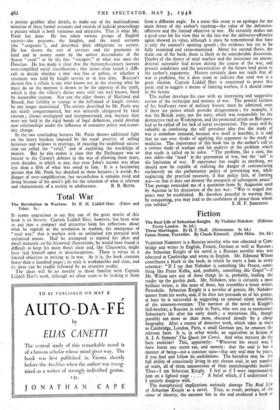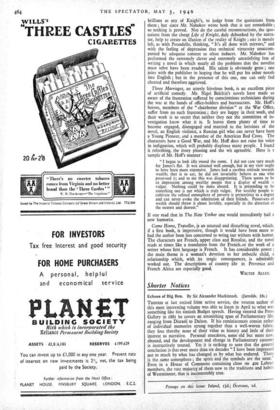Fiction
Three Marriages. By H. F. Hoff.- (Heinemann. 8s. 6d.) Come Home, Traveller. By Claude Kinnoull. (John Miles. 10s. 6d.)
VLADIMIR NABOKOV is a Russian novelist who was educated at Cam- bridge and writes in English, French, German as well as Russian ; the Sebastian Knight of his novel is a Russian novelist who was educated at Cambridge and wrote in English. Mr. Edmund Wilson contributes a blurb to the book, in which he starts a hare in every sentence: "If I say that Nabokov is something like Proust, some- thing like Franz Kafka, and, probably, something like Gogol"—if Mr. Wilson says any of these things he is, probably, leading the reader up the garden path. Mr. Nabokov, who is certainly a most brilliant writer, is like none of these, but resembles a lesser writer, Pirandello. Sebastian.Knight is a novelist of genius; Mr. Nabokov quotes from his works, and, if he does not'persuade us of his genius, at least he is successful in suggesting an unusual talent smacking of the nineteen-twenties.- The narrator of the novel is Knight's half-brother, a Russian in exile in Paris, who sets out to reconstruct Sebastian's life after his early death ; a mysterious life, though possibly not more so than most, obscured already by a cheap biography. After a course of detective work, which takes in visits to Cambridge, London, Paris, a small German spa, he amasses the relevant facts. It is, in other words, an equivalent in fiction of A. J. A. Symons' The Quest for Corvo. And what mystery do the facts enshrine? This, apparently: "Whatever his secret was, I have learnt one secret too, and namely : that the soul is but a manner of being—not a constant state—that any soul may be yours, if you find and follow its undulations. The hereafter may be the full ability of consciously living in any chosen soul, in any number of souls, all of them unconscious of their interchangeable burden. Thus—I am Sebastian Knight. I feel as if I were impersonating him on a lighted stage . . . . A belief which, if I understand it, I entirely disagree with. The metaphysical implications seriously damage The Real Lite of Sebastian Knight as a novel. True, as result, perhaps, of the sense of identity, the narrator has in the end produced a book as brilliant as any of Knight's, to judge from the quotations from them ; but since Mr. Nabokov wrote both that is not remarkable ; so nothing is proved. Nor do the careful reconstructions, the quo- tations from the cheap Life of Knight, duly debunked by the narra- tor, help to create an illusion of the reality of Knight ; one is merely left, as with Pirandello, thinking, " It's all done with mirrors," and with the feeling of depression that technical virtuosity unaccom- panied by adequate content so often induces. Mr. Nabokov has performed the extremely clever and extremely unsatisfying feat of writing a novel in which nearly all the problems that the novelist must solve have been evaded. His talent is obviously great ; one joins with the publisher in hoping that he will put his other novels into English ; but in the presence of this one, one can only feel cheated and therefore aggrieved.
Three Marriages, an utterly frivolous book, is an excellent piece of artificial comedy. Mr. Nigel Balchin's novels have made us aware of the frustration suffered by conscientious technicians during the war at the hands of office-holders and bureaucrats. Mr. Hoff's heroes, members of the " chairborne division " at the War Office, suffer from no such frustration ; they are happy in their work, and their work is so secret that neither they nor the committee of in- vestigation know what it is. It leaves them plenty of time to become engaged, disengaged and married to the heroines of the novel, an English violinist, a Russian girl who can never have been a Young Pioneer, and a member of the American Red Cross. The characters have a Good War, and Mr. Hoff does not raise his voice in indignation, which will probably displease many people. I found it refreshing, the irony pleasing and the wit agreeable. Here is a sample of Mr. Hoff's manner :
" I began to look idly round the room. I did not care very much for James's flat. It was situated well enough, but in my view ought to have been more expensive. James had a careless attitude towards wealth; that is to say, he did not invariably behave as one who possessed it; and to me this was disappointing. There seems to be an impression among wealthy people that a display of wealth ;s vulgar. Nothing could be more absurd. It is pretending to be something one is not which is truly vulgar. For wealthy people to cultivate the refined atmosphere of poverty is pretentious to a degree and can never evoke the admiration of their friends. Posses'ors of wealth should throw it about lavishly, especially in the direction of the nearest and dearest."
If one read that in The New Yorker one would immediately hail a new humorist.
Come Home, Traveller, is an unusual and disturbing novel, which. if a first book, is impressive, though it would have been more sc had the author been less concerned to wring our withers with horror. The characters are French, upper class and Royalist, and the novel reads at times like a translation from the French-or the work of a writer whose first language is French. It has considerable power ; the main theme is a woman's devotion to her imbecile child, a relationship which, with its tragic consequences, is admirably worked out. The descriptions of country life in Provence and French Africa are especially good.
WALTER ALLEN.































 Previous page
Previous page